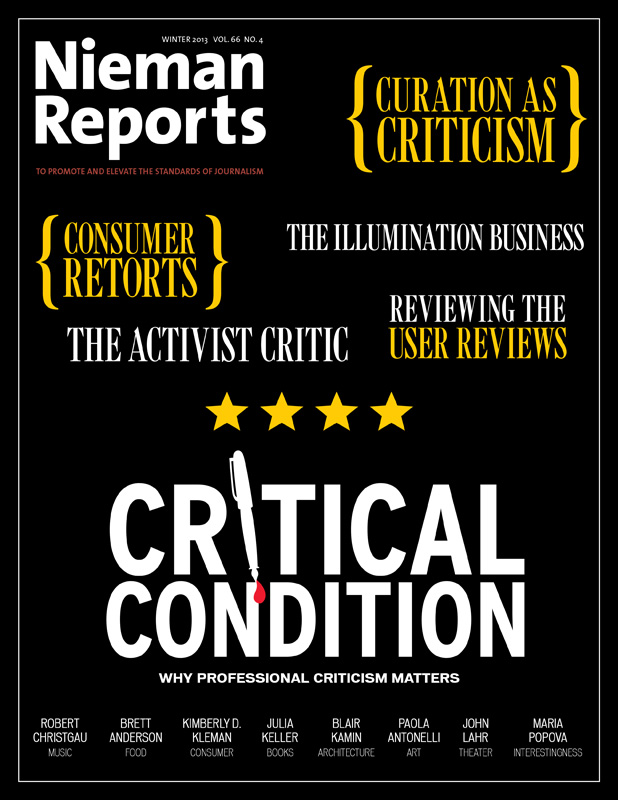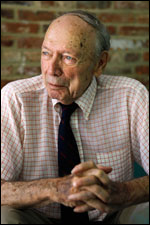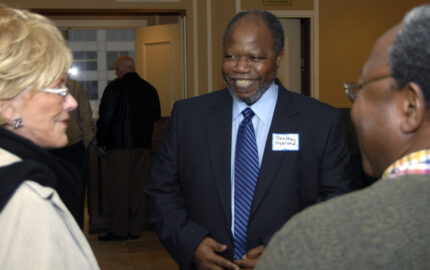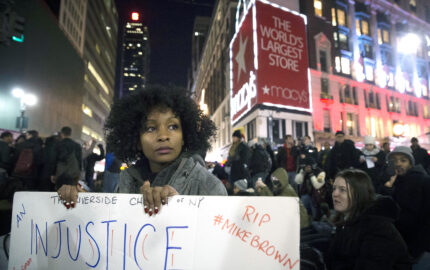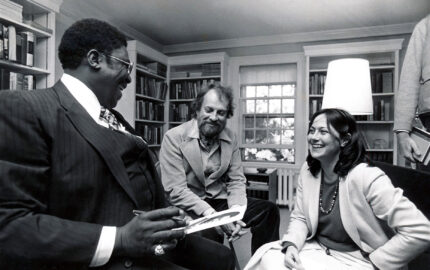Stanley Karnow, NF '58, a Pulitzer Prize-winning historian and journalist, died of congestive heart failure at his home in Potomac, Maryland on January 27th. He was 87. Karnow spent much of his career overseas, reporting from Europe, Africa and Asia for Time, The Saturday Evening Post, and The Washington Post, among others. In 1983, he was chief correspondent for a 13-hour television documentary "Vietnam: A Television History" for Boston public television station WGBH-TV, and wrote a 750-page accompanying book, "Vietnam: A History." The documentary won six Emmy awards, as well as Peabody, Polk and DuPont-Columbia awards. Six years later, he published "In Our Image: America's Empire in the Philippines," which won the 1990 Pulitzer Prize for History and was also accompanied by a three-part television documentary, "The U.S. and the Philippines: In Our Image."
Stanley and I were both very active editors at the Harvard Crimson in the late 1940s. I remember one other former editor was furious that we had endorsed a candidate for Congress. It was a race between newcomers, and he was mad because it was a political issue, not a Harvard issue. Of course, the candidate for Congress was John F. Kennedy so I have no apologies for endorsing him.
At that time, many of the Crimson editors really wanted to be professional journalists. That was certainly true for the two of us. I went right into newspaper work when I left college, and so did Stanley in magazines. It was a period when the United States was very much consumed by foreign issues. There was the end of World War II, the forming of various alliances, NATO, the cold war, nuclear weapons.
So in the summer of 1947, Stanley and I arranged passage on a freighter from Baltimore to Le Havre, France. It was supposed to take a week, but it took two. We were marooned in fog in the English Channel, and we finally arrived—not in La Havre, but in Rotterdam. So we went from Rotterdam to Paris by train, and I stayed for about two weeks. Stanley stayed for 10 years.
He spoke very good French to start with, and he knew the country very well. He eventually got on the staff of Time as a "European hire," which meant he was paid less than the Americans sent over to be correspondents. He spent decades dealing with foreign policy and with leaders of countries all around the world, but he was utterly American all along.
He was also extremely funny. I remember years later he was in Taiwan for Time, and he had a visit from Henry Luce, who was an ardent, fanatical supporter of Chiang Kai-shek and opponent of the Chinese Communists. Of course, when the boss visits your country, you snap to attention and make sure everything runs smoothly. But when they left, Mr. Luce was extremely worried about his luggage. And he kept saying to Stanley, "I'm sure they've lost my luggage. I just know it. They've lost it." Finally, Stanley turned to him and said, "Well, it's possible. They lost the mainland."
He was my oldest friend, and we would speak on the telephone every week or two. I was really shocked at Stanley's death. That's quite silly, because he was 87 years old and because he'd been ill a lot recently. But what I realized with his death is that I must have had, somewhere in the back of my mind, the notion that he was immortal. We all die. And I'm 85, not far off him.
It reminds me of what a very wise South African said to me, probably 10, 15 years before the end of apartheid and the arrival of Nelson Mandela. Looking at the scene in South Africa, at this terrible racial system, he said, "The end is inevitable, but not predictable." That could go for somebody's dying too.
Anthony Lewis, NF '57, is a former New York Times columnist and Washington correspondent who specialized in the Supreme Court and First Amendment issues. He has twice been awarded the Pulitzer Prize for National Reporting.
Stanley and I were both very active editors at the Harvard Crimson in the late 1940s. I remember one other former editor was furious that we had endorsed a candidate for Congress. It was a race between newcomers, and he was mad because it was a political issue, not a Harvard issue. Of course, the candidate for Congress was John F. Kennedy so I have no apologies for endorsing him.
At that time, many of the Crimson editors really wanted to be professional journalists. That was certainly true for the two of us. I went right into newspaper work when I left college, and so did Stanley in magazines. It was a period when the United States was very much consumed by foreign issues. There was the end of World War II, the forming of various alliances, NATO, the cold war, nuclear weapons.
So in the summer of 1947, Stanley and I arranged passage on a freighter from Baltimore to Le Havre, France. It was supposed to take a week, but it took two. We were marooned in fog in the English Channel, and we finally arrived—not in La Havre, but in Rotterdam. So we went from Rotterdam to Paris by train, and I stayed for about two weeks. Stanley stayed for 10 years.
He spoke very good French to start with, and he knew the country very well. He eventually got on the staff of Time as a "European hire," which meant he was paid less than the Americans sent over to be correspondents. He spent decades dealing with foreign policy and with leaders of countries all around the world, but he was utterly American all along.
He was also extremely funny. I remember years later he was in Taiwan for Time, and he had a visit from Henry Luce, who was an ardent, fanatical supporter of Chiang Kai-shek and opponent of the Chinese Communists. Of course, when the boss visits your country, you snap to attention and make sure everything runs smoothly. But when they left, Mr. Luce was extremely worried about his luggage. And he kept saying to Stanley, "I'm sure they've lost my luggage. I just know it. They've lost it." Finally, Stanley turned to him and said, "Well, it's possible. They lost the mainland."
He was my oldest friend, and we would speak on the telephone every week or two. I was really shocked at Stanley's death. That's quite silly, because he was 87 years old and because he'd been ill a lot recently. But what I realized with his death is that I must have had, somewhere in the back of my mind, the notion that he was immortal. We all die. And I'm 85, not far off him.
It reminds me of what a very wise South African said to me, probably 10, 15 years before the end of apartheid and the arrival of Nelson Mandela. Looking at the scene in South Africa, at this terrible racial system, he said, "The end is inevitable, but not predictable." That could go for somebody's dying too.
Anthony Lewis, NF '57, is a former New York Times columnist and Washington correspondent who specialized in the Supreme Court and First Amendment issues. He has twice been awarded the Pulitzer Prize for National Reporting.
